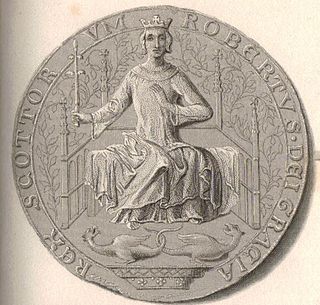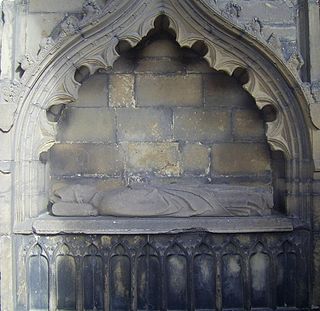Related Research Articles

Robert II was King of Scots from 1371 to his death in 1390. The son of Walter Stewart, 6th High Steward of Scotland, and Marjorie, daughter of King Robert the Bruce, he was the first monarch of the House of Stewart. Upon the death of his uncle David II, Robert succeeded to the throne.

Alexander Stewart, Earl of Buchan, called the Wolf of Badenoch, was the third surviving son of King Robert II of Scotland by his first wife Elizabeth Mure. Alexander married the widowed Euphemia I, Countess of Ross, but they had no children. He did have a large family by his longtime mistress, Mairead inghean Eachainn.
William Turnbull was a Scottish politician and bishop, credited with founding Jedburgh Grammar School and the University of Glasgow. He served as the Bishop of Glasgow, from 1448 to 1454 and was the first Chancellor of the University of Glasgow.

Clan Kennedy is a Scottish clan of the Scottish Lowlands.
The Lord Chancellor of Scotland, formally the Lord High Chancellor, was a Great Officer of State in the Kingdom of Scotland.
James Kennedy was a 15th-century Bishop of Dunkeld and Bishop of St. Andrews, who participated in the Council of Florence and was the last man to govern the diocese of St. Andrews purely as bishop. One of the Gaelic clan of Carrick he became an important figure in the government of the minority of King James III of Scotland as well as founder of St Salvator's College, St Andrews.
William de Bondington was a 13th-century Chancellor of Scotland and a bishop of Glasgow.

William de Lawedre was Bishop of Glasgow and Lord Chancellor of Scotland.
John de Peebles [Peblys] was a 14th-century bishop of Dunkeld and chancellor of Scotland. He was a graduate of the University of Paris by 1351, where he became both a determinant and licentiate. He chose to remain there and soon became procurator of the "English nation" before obtaining a doctorate in Canon law. From 1360 he was an official in the bishopric of Glasgow and was master of the hospital of Peebles. By 1365 he was treasurer of Glasgow. Eventually he held canonries and prebends in that diocese and in the diocese of Aberdeen and controlled the church of Douglas. By 1374 he was archdeacon of St Andrews and the papal collector for the Kingdom of Scotland. He was provided to the bishopric of Dunkeld by Pope Gregory XI either in late 1377 or early 1378.
John de Ralston was a 15th-century Scottish bishop and administrator. He was regarded as illegitimate, although today his parents are not known. Ralston appears in the records for the first time in 1426, where he is chaplain and secretary to Archibald Douglas, 5th Earl of Douglas. He retained this position on the death of Douglas in 1439. Between 1429 and 1443 he served as the fourth provost of Bothwell Collegiate Church, the home church of the Douglas earls. On 26 November 1445 he became dean of the diocese of Dunkeld.
Adam de Tyninghame was a 14th-century cleric and, as his name suggests, a probable native of Tyninghame in East Lothian.

John de Winchester was a 15th-century English cleric who distinguished himself as an administrator and bishop in Scotland. Winchester was a student of canon law from 1418, graduating with a bachelorate in 1421.
Michael Ochiltree [Ouchtre] was a 15th-century Scottish prelate and administrator. A close associate of King James I of Scotland, from the late 1410s he rose in rank from canon to Dean of Dunblane and then Bishop of Dunblane. He was responsible for the coronation of King James II of Scotland, and he obtained a grant from the crown which allowed the comparatively small diocese of Dunblane to attain historically unprecedented viability.
Ingram de Ketenis was a medieval cleric from Angus in Scotland.
Thomas de Buittle [Butil, Butill, Butyll, Butyl, Bucyl] was a Scottish prelate, clerk and papal auditor active in the late 14th and early 15th centuries. Probably originating in Galloway, Scotland, Thomas took a university career in canon law in England and France, before taking up service at the court of Avignon Pope Benedict XIII. He obtained a number of benefices in the meantime, including the position of Archdeacon of Galloway, and is the earliest known and probably first provost of the collegiate church of Maybole. The height of his career came however when the Pope provided him to the bishopric of Galloway, a position he held from 1415 until his death sometime between 1420 and 1422.
Alexander Stewart was a 14th-century Scottish bishop. Probably from Menteith, he appears in the sources from the first half of the 1340s, possessing a university degree and holding the position of Archdeacon of Ross. He was active at the papal curia in the second half of the decade as a papal chaplain and administrator, before being provided as Bishop of Ross in 1350, a position he held until his death in 1371.
Patrick de Leuchars [also de Locrys or de Lochrys] was a 14th-century administrator and prelate in the Kingdom of Scotland. He first appears in the records in 1344 holding a church in East Lothian, and in 1351 attains national prominence as the new Bishop of Brechin. Bishop Patrick, who would be a core supporter of King David II of Scotland, became Royal Chancellor in the same decade. He held the chancellorship until around 1370, and the bishopric of Brechin until 1383, when he resigned it on account of his old age.
Dúghall of Lorne [or de Ergadia] was a late 14th century and early 15th century prelate in the Kingdom of Scotland. Probably a MacDúghaill (MacDougall) from the province of Lorne in Argyll, he appears to have studied at the University of Oxford before returning to Scotland for an ecclesiastical and administrative career. He obtained benefices in the diocese of Argyll, Dunkeld, Dunblane and St Andrews, and acted as the secretary and chaplain of Robert Stewart, Earl of Fife, before becoming Bishop of Dunblane. He held the bishopric of Dunblane until his death in 1403.
Walter de Coventre was a 14th-century Scottish ecclesiastic. There is no direct evidence of his birthdate, his family, or his family's origin, although he may have come from the region around Abernethy, where a family with the name de Coventre is known to have lived. Walter appeared in the records for the first time in the 1330s, as a student at the University of Paris. From there he went on to the University of Orléans, initially as a student before becoming a lecturer there. He studied the arts, civil law and canon law, and was awarded many university degrees, including two doctorates. His studies were paid for, at least partially, by his benefices in Scotland. Despite holding perhaps more than five benefices at one stage, he did not return to Scotland until the late 1350s.
Adam Houghton, also known as Adam de Houghton, was Bishop of St David's from 1361 until his death and Lord Chancellor of England from 1377 to 1378.
References
- Dowden, John, The Bishops of Scotland, ed. J. Maitland Thomson, (Glasgow, 1912)
- MacQueen, Hector L., "Carrick, John (d. 1380/81)", in the Oxford Dictionary of National Biography, Oxford University Press, 2004, accessed 19 Feb 2007]
- Watt, D.E.R., Fasti Ecclesiae Scotinanae Medii Aevi ad annum 1638, 2nd Draft, (St Andrews, 1969)